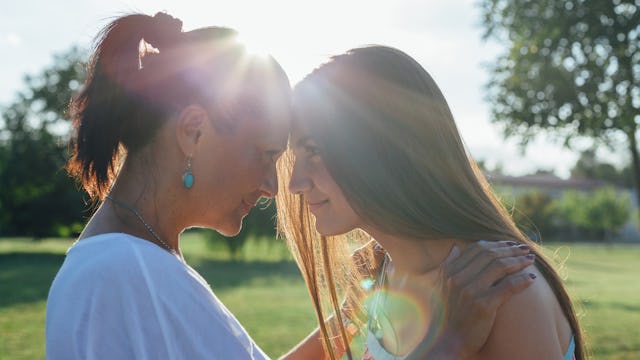I Won’t Tell My Kids ‘Don’t Smoke Weed’ — Here’s Why

I tell my kids “no” a lot. No, you can’t have another bowl of ice cream before dinner. No, you can’t watch Bridesmaids. And no, don’t drop the f-bomb in front of your little sister. But when it comes to weed, I don’t “just say no.”
As a parent, I am quite familiar with the many ways saying “no” backfires. My 6-year-old wears swim goggles to school anyway, the 13-year-old eats the last double-chocolate chip cookie I had stashed away for myself and the teen stays up in to the wee hours binge watching New Girl. Luckily, these transgressions aren’t dangerous and are more a matter of upending my parenting principles than anything else.
Not so with pot.
Cannabis, despite being medically legal in 29 states, can be very dangerous, especially for still-developing humans. Which is why I don’t tell my teens not to smoke it. Confusing right? Except if you consider how the teen brain works.
Kids at any age are curious. Tweens and teens – the age when access to weed usually comes online – are also stressed out, at the mercy of peer pressure and primed to take risk. Throw in the anti-authoritarian attitude most teens excel at and when you tell them, “Don’t ever smoke weed,” they’re like, “Oh, yeah? Maybe I will then.”
Remember, they are not operating on all cylinders – literally. Their brains are still growing. They don’t like to be told what to do and many of them will in fact do the opposite just because. Teens are impulsive creatures who do not always have the capacity to make rational decisions. That said, they do have the capacity to take in information and draw on it to make good choices.
That’s why instead of telling my kids not to smoke weed, I tell them what it does to their bodies and their brains. I tell them pot is much stronger today that it was when I was kid. I tell them how it screws with their frontal lobe development – the area in charge of executive functioning, which is pretty damn important. I try not to get too dramatic about it, holding back the urge to scream NEVER EVER EVER DO DRUGS! I just act totally cool, like I’m fascinated with the science and research and want to share it with them because it’s so interesting.
Turns out, it actually is interesting to teens. Many school systems now use evidence-based curriculum to teach teens about drug use and the feedback is positive. Instead of scaring kids about the dangers of drug use like the “Just Say No” campaign I grew up with did, these programs highlight critical thinking and decision making based on facts. The hope is that kids won’t smoke weed or use cannabis – at least not until they’re more mature and their brain development is no longer at risk. The big takeaway isn’t “don’t do drugs” — it’s “put it off as long as possible.”
In an interview with NPR, Jennifer Grellman, a psychotherapist in Kentfield, Calif., and the founder of Being Adept, an evidence-based drug education curriculum, says delaying is the key strategy now: “The way to handle that with your kids is to say: ‘You know, you don’t have to use this now. Maybe you want to use it someday, but not today, not now. It will always be there.’ Just tell them to wait.”
Shifting the goal of drug use education from abstinence to delay is a big one. With pot so readily available, it might not make sense to expect my teens to never try it, in the same way it’s not realistic to expect them not try alcohol. Plus, with more and more research showing the real benefits of medical marijuana, I don’t want to stigmatize it if it can help them in the future. Leaving the ultimate decision about whether or not to use pot up to my teens means they might very well go ahead and smoke the weed or eat the edible – and that gives me serious stomach knots.
It’s not always easy to stand back and let our kids make choices of their own. We want the best for them, to protect them and keep them from harm. The thing is, that’s not our forever job. We’re supposed to make sure they’re ready to live in the world on their own and that means letting go and trusting them to make good choices. It’s bittersweet and hard as hell and one hundred percent necessary. The least we can do is arm them with information.
Making sure teens have as many facts as possible about cannabis use makes sense. It’s not legitimizing a behavior or condoning it. It’s giving them real data they can draw on when they need to make smart choices about drugs or anything else potentially life-changing, like sex or alcohol use.
In a way, this approach is really empowering. Instead of reflexively rebelling against what isn’t allowed or being scared into behaving a certain way, teens can make an informed decision about what’s best for them. Meanwhile, I’ll keep nonchalantly flinging out fascinating facts about the way pot messes with brain development, just to make sure they’re getting all the information they need.
This article was originally published on